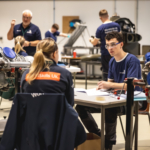After weeks of anticipation, the UK Government’s Industrial Strategy has now been published and we welcome its focus on skills to boost the nation’s productivity and competitiveness. The Industrial Strategy makes it clear: we need more engineers, more technicians and more digital experts in areas such as driverless vehicles, life sciences, artificial intelligence and new infrastructure. Making a success of these exciting opportunities means we will need to engage more young people to help them develop their careers and skills to world-class levels.
Businesses, education and governments get this, which is why many are already working with WorldSkills UK. Investing in young people now to be able to help the UK compete internationally is the key to our future industrial success. Indeed, the man who is responsible for the strategy, Business Secretary, Greg Clark, understands this better than most as last month one of his constituents was part of Team UK who competed at the Skills Olympics in Abu Dhabi. Achieving a top 10 placing against the world’s biggest and most skilled nations, Team UK demonstrated how our young people are up to the challenge of building a world-class Britain. As Greg has said, ‘we can be more prosperous the more skilled we are’ and using the power of skills competitions to achieve this ‘is absolutely in the national interest’. With the Industrial Strategy in place, how then, do we make it a success?
If the Industrial Strategy is about one thing, it is about boosting productivity. As Greg states: ‘For all the excellence of our world-beating companies, the high calibre of our workforce and the prosperity of many areas, we have businesses, people and places whose level of productivity is well below what can be achieved’. A recent IPPR report highlighted the scale of the well-recognised problem and how UK productivity is ‘world-lagging’, trailing the G7 average by 13% and flatlining for the past decade. The Industrial Strategy ‘deliberately strengthens’ the foundations of productivity and WorldSkills UK can, through its partnership with leading colleges, training providers, and employers, contribute in three ways.
Firstly, our experience shows that tackling the issues surrounding productivity, partly lies in investing in not just skills set but employee mindset too. We have seen first-hand how mindset training can significantly improve productivity outcomes. In advance of flying out to Abu Dhabi, Team UK received mindset training based on lessons from elite sport. This prepared them for the high pressured challenges of the world’s toughest skills competition. World-beating performances are a combination of technical skills, physiological well-being and mindset. Working with leading employers including BAE Systems, Toyota and Airbus we are planning to bring this proven mindset training to the workplace.
Secondly, world-class performance relies on a relentless focus on world-class standards. The success of Team UK in the past and in the future should help drive the industrial strategy because we need technical education to be underpinned by the world-class standards. This will not only help boost employer confidence that training at the highest standard will improve productivity. It will also give young people and parents the confidence that taking up an apprenticeship or technical training will deliver a high quality career. Embedding the WorldSkills standards across the skills system is our goal.
And finally, as a recent BT and Accenture report identified, the take up of readily available and new technologies by young people is also key to boosting productivity. That’s why we are introducing new skills competitions into our portfolio in line with industrial strategy needs, including cyber security, industrial digitisation, lab technician and green technology. We are seeking new education and industry partners to accelerate the development of these.
The Industrial Strategy is a huge opportunity for the UK. However, for it to be successful, I believe we need an unwavering focus on employee mindset and skills set, world class standards, and new technologies. We will be developing and continuing to test all three as we set out on the road to, WorldSkills Kazan 2019 and WorldSkills Shanghai 2021. Investing more in young people to be focussed on the future and emerging opportunities, while leveraging our world-class methodology, is how WorldSkills UK can plays its part most effectively.


